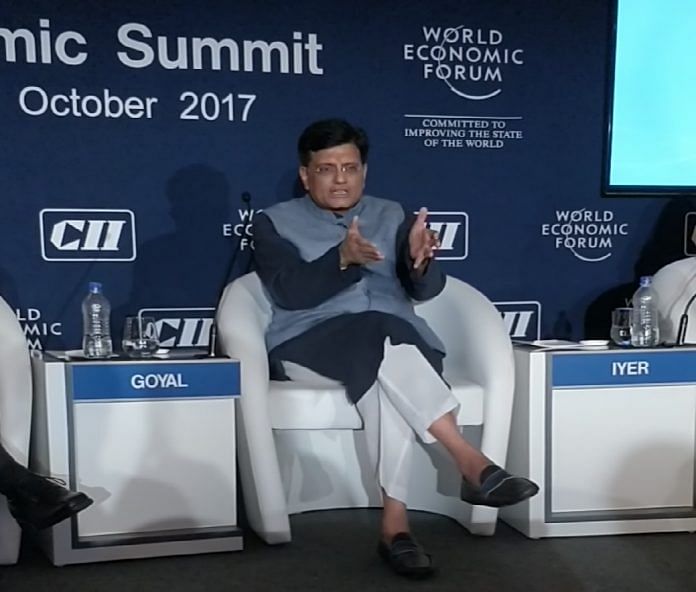Ministers Suresh Prabhu and Piyush Goyal quell fears about job cuts, say technology could create new opportunities.
New Delhi: India needs to modernise its manufacturing with the use of technology and should not be averse to automation for the fear of job losses, senior ministers in the Narendra Modi cabinet said.
“The future of manufacturing is not going to be the same as it is today…we are working on some of the important emerging industries — maybe in 5-6 different sectors. We still have to find a better future than what it is today,” said commerce and industry minister Suresh Prabhu, speaking at the World Economic Forum’s India Economic Summit Thursday.
He also stressed on the need to modernise industries in which “India has a natural advantage, like textiles”.
His comments came after some young entrepreneurs raised concerns that “technological disruption” created by automated manufacturing, digitalisation and artificial intelligence could render many traditional jobs obsolete in the future.
According to some participants, with about 65 per cent of the Indian population being of working age, there is a need to ensure that this transition does not adversely affect the workforce of the country.
Although technological disruption impacts jobs in all sectors, the most vulnerable is the manufacturing field, where manual tasks can be replaced by robotics, they said. However, when this concern was posed to Prabhu, he explained that there is a need to integrate India with the global economy to keep up with the transformative nature of the manufacturing industry.
“We have huge human resource available; we have knowledge of doing that; we have an entire eco-system. However, while we modernise the industry, we need to look at those industries which will have a greater future than what it is today,” Prabhu added. “We must also keep in mind that artificial intelligence will have an impact on all industries, that advance robotics will have an impact on them, so we have to think about it.”
Railways and coal minister Piyush Goyal said that automation could create opportunities in different ways. He highlighted that as India moves towards sustainable electricity production with the use of solar and wind power, the jobs created would be far more in number.
He said, “We can’t have a situation where we say that it’s the West, (where) by and large everyone has a car, should first replace all its vehicles with electric ones. India has the opportunity to leapfrog, so we can start with electric vehicles for 90 per cent of the people who don’t have vehicles yet.”
Speaking a day earlier at the summit, textile minister Smriti Irani claimed that perceiving technology as a threat to the textile industry was just “fear mongering”.
Meanwhile, industry leaders said the government should replace old technology with the new one. Elaborating on this, Sumit Sawhney, CEO of Renault India, said that the government also needs to have a “scrapping policy” where the old technology is discarded to create demand for a fresh one. “Imagine today, you have 40 million cars. Of this, you can scrap close to 15-20 million. Even if you scrap 10 per cent of it, another 5 per cent will inject a fresh demand.”



